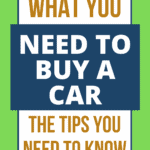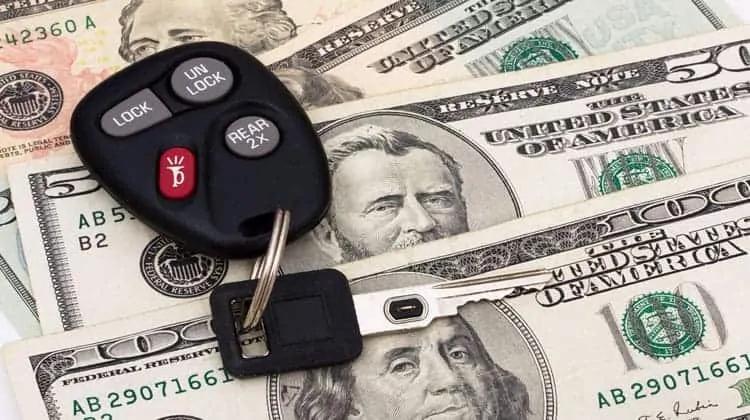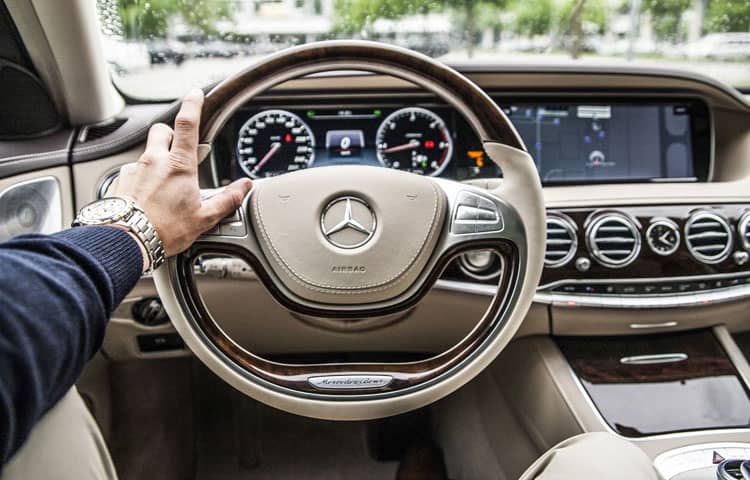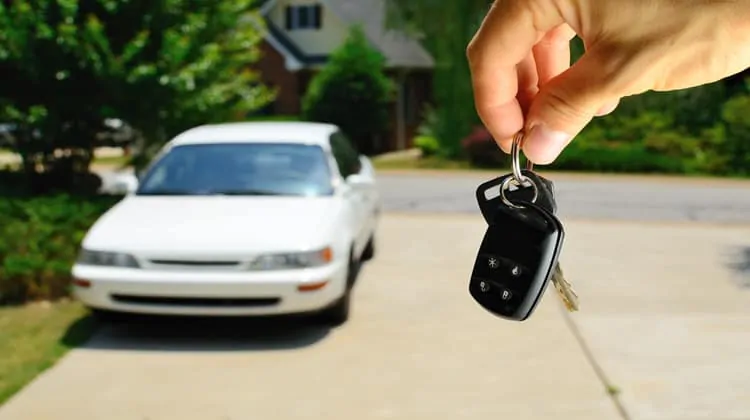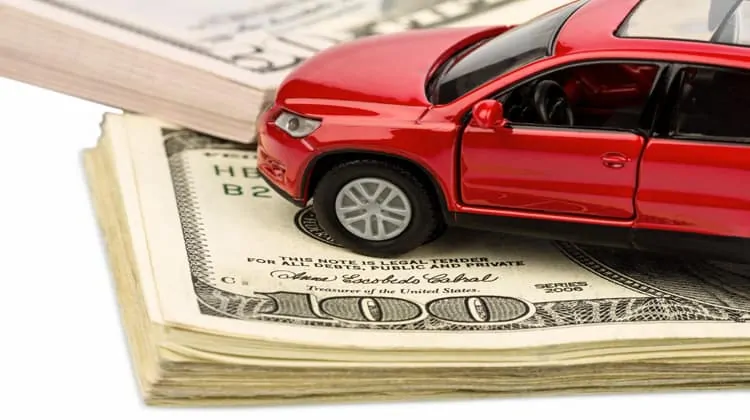THIS POST MAY CONTAIN AFFILIATE LINKS. PLEASE SEE MY DISCLOSURES FOR MORE INFORMATION
Buying a car can easily be an overwhelming process for anyone, regardless if this is your first car or not.
In fact, many people are clueless when it comes to what they need to buy a car.
In this post, I’ll run through all the documents you need to finalize the purchase of your next car as well as how to buy a car.
In the end, you will have confidence that you have everything you need and are getting the best price possible.
Table of Contents
What Do You Need to Buy a Car?
New Car Purchase Checklist
When buying a car, there are certain documents you need to bring with you to complete the transaction.
Depending if you are buying a new car or used car, you will need a few different documents, so be sure to read through the entire checklist to make sure you have what you need.
The last thing you want to is to have to delay the purchase because you forgot something.
#1. The Payment
The form of payment can be cash or check if you are buying the car outright without a loan.
While you can use a credit card, most dealers have a limit on the maximum amount you can put on your credit card.
This is because the credit card processing fees they pay eat into their profit.
In most cases, the limit is around $5,000.
If you are taking out an auto loan, and are using a bank or credit union, you will have to bring the check they give you.
If you choose to let the dealership handle the financing, then you can make the down payment with your credit card.
Even a cashier’s check, a personal check, or cash is acceptable.
And even if you plan on taking advantage of dealer financing for a special rate, it makes sense to still get pre-approved by another lender.
The reason is because you have no control over the loan process.
The dealer financing unit might find a reason to not offer you a loan, or one at a high interest rate.
By having a backup source of funding, you can still buy the car and not waste your time by not getting approved.
#2. Driver’s License
The dealer will need your driver’s license to verify your identity and ensure that you’re permitted to take the vehicle home.
While most people keep their license in their wallet, it is a good idea to check that you have it.
And while you are at it, make sure it is still valid.
An expired license is going to hold up the entire car buying process.
#3. Car Insurance
You will need proof of insurance to be able to drive your new car and take it home.
If you know the car you will be purchasing, including the vehicles identification number (VIN), you can call your insurance agent and add the car to your insurance policy.
They will then email you the insurance card you will have to show the dealer that you have insurance coverage.
If you don’t know what car you are going to buy, you can simply show the dealer your auto policy for your current vehicle.
This will be enough for them.
Once you complete the purchase, you have a few weeks to call your insurance agent and add the new vehicle to your policy.
The time you have varies by state, so don’t wait to make the call.
Just make sure that before you finalize car insurance, you’ve shopped around and compared auto insurance rates ahead of time to ensure you’re getting the best deal possible.
#4. Credit Score
If you plan on taking dealer financing, make sure you run your credit report and get a copy of your credit score first.
You can get your credit report for free by visiting AnnualCreditReport.com.
Make sure you look over the report from each credit bureau, Experian, Equifax, and TransUnion, as you don’t know which one the dealership is going to review.
Make sure there are no major mistakes on your report, as this can hurt your credit score.
As for your credit score, you have to pay for this.
The cost is less than $20 and it is worth it.
This is because your score will determine the interest rate you pay on the loan.
Don’t worry if you don’t have excellent credit.
Most dealers will offer you a good financing deal as long as you have good credit.
If you have bad credit, then I would recommend either delaying the purchase until you can improve your score.
Or maybe consider buying a car you don’t need to take out a loan for.
- Related: Click here for the best beater cars
The reason is because the interest rate you pay with bad credit will be sky high.
Finally, the reason you want to bring your credit score is some shady dealers may try to claim you have a lower credit score than you do.
This allows them to charge you a higher interest rate.
By showing them what your credit score is, they cannot pull this trick.
#5. Back Up Funding
I mentioned this briefly before, but having a pre-approval is a good idea.
You never know if the car salesman misunderstood you and offered you a better financing rate or special bonuses that you don’t qualify for.
By having back up funding, you can still buy the vehicle and not waste your time.
This almost happened to me once.
I was taking the dealer financing because it allowed me to get 2 additional rebates, saving me another $2,500.
But it turned out I didn’t qualify for them.
If I didn’t have as high of a credit score, the pre-approval from my bank would have been a better financing offer.
To find the best auto loan offers, start with your current bank and then visit some local credit unions.
These places tend to offer the lowest rates for loans.
#6. Pay Stubs And Utility Bills
These are not always needed, so you can call ahead to verify if you need to bring them, or you can just bring them.
Pay stubs are needed to verify employment and income.
This is especially true if you just started the job.
Bring at least 2 months worth of pay stubs.
For utility bills, these are needed if you recently moved, or to show proof of residence if you are buying out of state.
For most dealers, you can bring your electric bill and cable bill to satisfy this need.
Just make sure that your account number is on the bill in case the dealer needs to call to verify the information.
#7. Documents For Discounts And Rebates
If you are getting discounts or rebates off the purchase price, make sure you bring the required forms to prove eligibility.
For example, if you are taking advantage of a military discount, bring your military ID.
If you are getting a discount for being a recent college graduate, bring your transcripts.
For any other rebates or discounts, ask the dealer if you need to bring any documentation and be sure to read the find print to make sure you qualify.
Many car salesmen will tell you that you qualify just to get you in the door.
#8. Title And Registration If Trading In
If you’re trading in your old vehicle, you will have to show proof of ownership.
The car title, also known as the pink slip or certificate of title, is usually good enough.
Make sure to have a good look at the document to ensure you own the vehicle and have the right to sell it.
You’ll need approvals in the form of signatures if there’s a lien against the vehicle or a co-signer.
It’s very important to be careful so that the title is not rejected by the dealer or the DMV.
We suggest that you talk to someone at the dealership and be sure of the matter.
You’ll also have to bring a copy of the current vehicle registration if you’re going to trade it in.
Be sure to also bring with you service records so you can show you have taken good care of the car.
#9. The Car To Trade In
Obviously, if you are planning to trade in your car, you need to bring it with you.
But before you go to the dealer, take the time to clean out the car, including washing and waxing the exterior, and vacuuming the interior.
You want this car to shine.
The reason is because it will imply you took good care of it and impressions matter.
Even if this means you spend a few dollars to get it professionally cleaned, it will be money well spent.
Of course, if your car is a beater and only worth $500, don’t go overboard here.
Give it a good cleaning inside and out and call it a day. Doing this might allow you to negotiate for an additional $250-$500.
#10. Additional Documents
If you are buying a car out of state, be sure to talk to the dealer before you travel there to make sure you have everything you need.
Many times you will have to pay additional fees, so having extra cash or checks is needed.
In some cases, you might need other documents, but this is more the exception.
#11. Transportation
If you are not trading in your vehicle, you will need to bring someone along to drive your current car home.
Or you might want to have a ride lined up so they can drop you off at the dealership.
While this won’t be a deal breaker in buying a car, it is something many people overlook.
How To Buy A Car From A Dealer
Now that you know what documents you need to bring with you to complete the purchase of the car, it is time to understand how to buy a car from the dealer.
#1. Figure Out What You Can Afford
The first step in the car buying process is to figure out your budget.
Many people do this step incorrectly.
They simply look at their budget and determine the amount of monthly payments they can afford.
The problem with this is you can pay a lot more for a car looking at the monthly payment instead of the overall cost of ownership.
You need to take into account the purchase price, cost of insurance, maintenance, gas, etc.
- Related: Click here to learn 20 ways to lower car expenses
- Related: Learn the best hacks for free gas
Then you need to figure out the overall purchase price and how much you need to put down to get a comfortable monthly payment.
#2. Check Your Credit
It’s critical that you check your credit report and score to make sure you can qualify for the better auto loan rates.
Getting a lower interest rate will save you money by having your monthly payment lower and you will pay less interest overall.
If your credit is bad, I encourage you to first work on improving it so you get a better loan rate.
#3. Determine The Car You Want
Now that you have a price range for your next car, you need to decide what you want in a car.
Since each person has different needs, I won’t get into what type of car you should be buying.
Just keep in mind how you plan to use the vehicle, what options are important to you, etc.
For example, if you live in a snowy climate, a sports car might not be the best choice for you.
#4. Find Out What Fair Pricing Is
Before you start searching for your car, you need to know when you spot a good deal.
So jump onto Kelley Blue Book or Edmunds to see what the price range is for the car you are considering.
These sites will allow you to enter in the vehicle color and options so you get an accurate number.
Once you have this, you can start searching for vehicles.
The best way to do this is an online search using AutoTrader.
If the car is new, you can do a search for local dealers that sell the car and view their inventory online.
#5. Get Pre Approved
Now that you found your car, it is time to get pre-approved.
As I mentioned earlier, it is best to get a preapproved loan at a local bank or credit union.
They may offer a competitive rate and in the worst case, allow you to buy the car if dealer financing falls through.
If you have excellent credit, I would look into dealer financing.
Many currently offer rates of 0% or under 2% for the life of the loan.
This is a great deal if you can get it.
Regardless of where you get the loan from, it is important you review the terms and understand it.
The biggest things to look for are the interest rate or APR you will be paying and the term of the loan.
You want the APR to be as low as possible.
For the term, or length of the loan, you want this to be in the 3 to 5 year period.
Many dealers will try to extend you into a loan of 7 years or longer.
This is a bad idea.
First you will be paying a lot more in interest charges.
And second, as the car depreciates in value, you could end up owing more than the car is worth down the line.
The last thing you want is to owe money on a car that experienced deprecation to the point where the car is virtually worthless.
#6. Start The Car Buying Process
The final step is to go and test drive the vehicle you want to make sure it meets your needs.
If it does, you can start process of buying the car.
Since this process is virtually the same for new or used cars, I put this into one section below.
How To Buy A Car Private Sale
Buying a car from a private party can be a great way to get a good deal.
But you can also buy a junker or get scammed depending on who the seller is.
Here are the tips you need to follow when buying a car from a private party.
Note that you will follow the first couple of steps above, like determining what you can afford and what you are looking for in a car.
Once you find the car you want, you can use the following tips.
#1. Take It For A Test Drive
It’s critical you take the car for a test drive.
Pay attention to how the car feels when driving, but also pay attention to the sounds it is or isn’t making.
You also want to be on the lookout for any odd sounds or smells.
A red flag is oil burning.
Finally, make sure you look at the dashboard.
Are any service lights one?
#2. Ask For Service Records
Ask the seller if they have any service records.
If they want to get top dollar for their car, they will have these documents.
In the event they don’t have the records, ask them where they get the car serviced.
You can then either ask them to go to the dealer or repair shop to get a copy of the records, or you can do it yourself.
#3. Get A Vehicle History Report
Service records are great but they won’t tell you the full story.
In a vehicle history report, you will see if the car was in any accidents, if it was flooded, etc.
This will cost a little money, but is well worth it if everything else checks out.
#4. Take It To Your Mechanic For Inspection
You need a car mechanic to look over the car.
Don’t take it to their mechanic.
Take it to your mechanic or one you trust.
They will point out everything that is wrong with the car and then you can decide how you want to proceed.
#5. Negotiate
The final step in the process is to negotiate the purchase price.
Once you do that, you can find a notary to visit to change the registration over to your name.
Buying A Car Out Of State
Buying a car out of state isn’t very different from buying in state.
You still need to negotiate and come to an agreement on price.
The only things you nee to be aware of are the different regulations and laws.
For example, another state might have different rules on smog than your state, which could have an impact on where you buy.
Or you might have to pay higher fees or additional fees because the other state charges more or there are simply more because you are out of state.
Then there is the process of registration.
Depending on where you buy it, you might have to register it with the DMV in that state and then change the registration with your DMV.
The bottom line is, expect extra paperwork when buying out of state.
Of course, you also need to plan on how to get to the dealer as well.
This isn’t to say you shouldn’t buy out of state.
You can score some great deals by doing this.
I’ve done it once and paid close to $4,000 less than what dealers in my area were quoting me.
But you have to do your homework.
The biggest horror story I found were people telling me they experienced a bait and switch.
The out of state dealer offered an amazing price but the person came to find out they didn’t qualify for all the rebates or the dealer simply didn’t honor the price they quoted.
They were then stuck in this dealer trying to figure out how to get back home, and if it was even worth it to give up now.
To limit the chances of this, I asked for quotes in writing and then I spoke with the salesperson a few times on the phone.
I wanted to get a feel for if he sounded shady or trustworthy.
I felt confident in moving forward, but there was an uneasiness until the paperwork was completed.
Negotiating Your Car
Whether you are buying new or used or from a dealer or a private party, negotiating the purchase price of a car is the same.
Below I highlight some of the more important things to do to make sure you get a good deal on your next vehicle purchase and do not overpay.
If you want to guarantee you save the most money on your next car, I encourage you to read the post below on negotiating for the best price.
The best way to get a good price on your next car is to do the haggling over email.
When you try to do it in person, you give the salespeople all the power.
They can delay the process and wear you out.
By doing the negotiating through email, you avoid this issue.
You also avoid the possibility of the salesman using pressure to get the deal he wants.
So find the car at a few local dealers and email each of them.
Give them specifics of what you are looking for, including:
- Model
- Color
- Trim level
- Options and Packages
Then ask them for their best out the door price.
This price will include all fees and taxes so you can compare the same number from each dealer.
Once you have their best offers, reach out back to each one that didn’t have the lowest offer and ask if they can beat it.
If they can’t, thank them for their time.
If they do beat it, then reach out the original lowest offer and as if they can be the new lowest offer.
Repeat this process one more time and you should have a competitive offer below the MSRP.
Agree to buy the vehicle and then follow the checklist above for what to bring with you.
I’ve used this negotiating tactic 3 times now.
I’ve ended up paying up to $10,000 under MSRP and $5,000 under invoice price.
A Trick If You Don’t Like Negotiating
What if you don’t like the idea of negotiating, even online?
You can use Edmunds.
With this service, Edmunds will partner with a local dealer to offer you a great price.
Just accept the offer and you are done.
I’ve had a handful of readers thank me for sharing this as it saved them time and money.
You can try it out by clicking below.
Frequently Asked Questions
Even after covering the basics of what you need to buy a car, you probably still have a lot of questions on your mind if you are a first time car buyer.
In this section, we have covered some of the most common questions one may have when it comes to buying a car.
Can the dealer register the car for me?
Yes, your dealer may be able to process registration for you.
They will however, charge you a fee for the service.
Your dealer will then provide you with a temporary registration slip or plate.
You will need it before you take your new car on the road.
However, the option may not be available if you’re buying your car from a different state.
In such a scenario, you must get a “drive away” permit and register your vehicle once you reach your state.
Can I pay in cash?
Yes, you can.
In fact, some dealers prefer that you pay in cash and may even be willing to offer discounts on cash payments.
Can I pay through personal check?
Yes.
Most dealers happily accept personal checks.
However, they may not accept future or temporary checks.
In addition to this, they may also reject a check if it is not in your own name.
Can I pay through the credit card?
Yes, you can, but not the whole amount, unless your car costs about $3,000.
Credit card fees can be expensive and they eat into the dealer’s profit.
Plus, there’s also the risk of credit card fraud or the buyer deciding to cancel the purchase in the future.
This is why most dealers prefer that you only make the down payment through your credit card.
Will I need to show a proof of employment?
This is not usually necessary.
However, you may be asked for pay stubs if you’re new to the country, have a bad credit score, or recently changed jobs.
It’s to assure that you’ll be able to make timely payments.
Should I consider extended warranties?
An extended warranty is good only if it is backed by the vehicles manufacturer.
Extras options like VIN etching and paint coating are usually not worth the price.
Instead, save your money and put the amount you would have spent into a savings account for future car related expenses.
My favorite online savings account is with CIT Bank.
There you can get a higher interest rate, which allows your money to grow faster.
Click the link below to open your free account.
Should I trade in my current car or sell it?
In most cases, you will make about 20% more money if you decide to sell your car privately instead of trading in.
However, trading in your car is less demanding.
Your best option is to see what the car is worth first.
You can do this online with a site like Edmunds.
Once you know the car’s value, determine if there is anything wrong with the car mechanically that you might have to fix in order to sell it yourself.
Finally, determine if you want to deal with negotiating for a decent trade in offer or if you can spend the time putting your car for sale and doing everything yourself.
I know a good friend who has done both.
He traded in a car that had the transmission going and didn’t want to deal with getting it fixed in order to sell it.
So he ended up trading it in.
In another instance, he sold a car himself.
It took time to take great photos and list the car, but he ended up getting a lot more by selling it rather than trading it in.
Wrapping Up
There is all you need to know about buying a car.
It can be an overwhelming process and a scary one considering how much money a car costs.
But it is also a great feeling when you drive your new car off the lot.
Take the time to make sure you gather all the paperwork you will need so there won’t be any surprises when you go to buy your next car.

